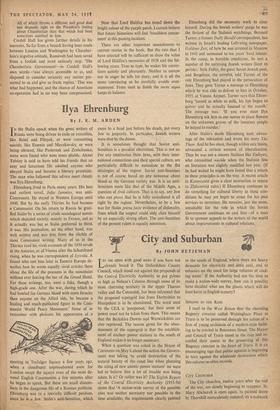Ilya Ehrenburg
By J. E. M. ARDEN IN the Stalin epoch when the great writers of Russia were being driven to exile or execution, like Babel and Pilnyak, or were committing suicide, like Essenin and Mayakovsky, or were being silenced, like Pasternak and Zoshchenko, some were found who were more pliable. Alexci Tolstoy is said to have told his friends that an easy and luxurious life awaited anyone who obeyed Stalin and became a literary prostitute. The man who followed this advice most closely was Ilya Ehrenburg.
Ehrenburg lived in Paris many years. His best and earliest novel, Julio Jurenito, was anti- Communist. He stayed in Western Europe until 1940. But by the early Thirties he had become a Communist. On his return to Russia he grati- fied Stalin by a series of crude sociological novels which depicted society, mainly in France, not as it actually was but as Stalin preferred to think it was. His journalism, on the other hand, was well writteq and, was free from the clichés of most Communist writing. Many of us in the Thirties read his vivid accounts of the 1934 revolt in the Asturias, or of Vienna after the Schutzbund rising, when he was correspondent of lzvestia. A friend who met him later in Eastern Europe de- scribes how he wrote equally vivid articles there about the life of the peasants in the mountains without ever leaving the bar of the Grand Hotel. For these writings, too, were a fake, though a high-grade one. After the war, during which he had howled for German blood with more ferocity than anyone on the Allied side, he became a leading and much-publicised figure in the Com- munist 'World Peace Movement.' Some of us remember with pleasure his appearance at a meeting in Trafalgar Square a few years ago, when a cloudburst unprecedented even for London swept the square even of the most de- voted English Communists a few minutes after he began to speak. But these are small discom- forts in the dangerous life of a Russian publicist. Ehrenburg was in a specially difficult position, since he is a Jew. Stalin's anti-Semitism, which came to a head just before his death, put every Jew in jeopardy. In particular, Jewish writers were shot by the dozen.
It is sometimes thought that Soviet anti- Semitism is a peculiar aberration. This is not so. For any totalitarian State Jews, with their inter- national connections and their special culture, are particularly difficult to assimilate to the flat ideologies of the regime. Soviet anti-Semitism is not of course based on any nonsense about blood as the German variety was. It is an anti- Semitism more like that of the Middle Ages, a question of rival cultures. That is to say, any Jew who can prove that he is fully assimilated is all right by the regime. Nevertheless, to be a Jew was for Stalin prima fade evidence of disloyalty, from which the suspect could only clear himself by an especially strong effort. The anti-Semitism of the present rulers is equally notorious. Ehrenburg did the necessary work to clear himself. During the Jewish writers' purge he was the fiercest of the Stalinist watchdogs. Bernard Turner, a former Daily Herald correspondent, has written in Israel's leading Left-wing newspaper, Goldene Zeit, of how he was arrested in Moscow in 1943 and sentenced to ten years' hard labour. In the camp, in horrible conditions, he met a number of the surviving Jewish writers (later to perish): Itzik Feller, the great Soviet Jewish poet, and Bergelson, the novelist, told Turner of the role Ehrenburg had played in the persecution of Jews. They gave Turner a message to Ehrenburg which he was able to deliver to him in October, 1955, at Vienna Airport. Turner says that Ehren- burg 'turned as white as milk, his lips began to quiver and he actually foamed at the mouth.' The message was: 'If you ever meet Ilya Ehrenburg ask him in our names to place flowers on the unknown graves of the innocent people he helped to murder.'
After Stalin's death Ehrenburg took advan- tage of the relaxation and wrote his story The Thaw. And he has since, though within safe limits, advocated a certain amount of liberalisation. Thus he was not a sincere Stalinist like Fadeyev, who committed suicide when the Stalinist line on literature was slightly modified last year. (If he had waited he might have found that a return to these principles is on the way. A recent article in Km/untwist gives a clear instruction to return to Zhdanovist rules.) If Ehrenburg continues to do something for cultural liberty in these con- ditions he may yet begin to atone for his past services to terrorism. He remains, just the same, unsuitable for the role in which the Soviet Government continues to cast him—of a man fit to sponsor appeals to the writers of the world about improvements in cultural relations.






























 Previous page
Previous page